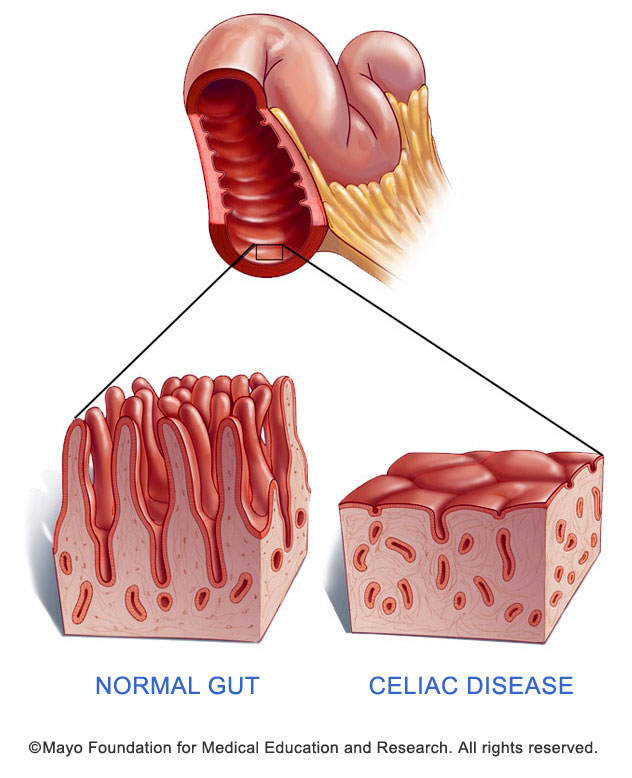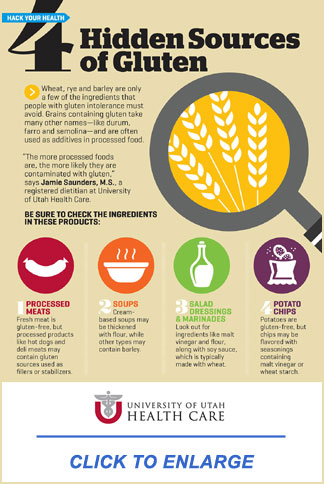What Is Celiac Disease? What Are the Symptoms?
What Are the Symptoms of Celiac Disease?
Celiac Disease Trigger Foods
What Is Celiac Disease?
Are you experiencing digestive troubles or other symptoms that make you suspect that your body may be reacting to grains such as wheat in your diet? Consult with your doctor to try to determine whether you may have celiac disease.
Celiac disease is an autoimmune disorder of the digestive system, primarily the small intestine, that occurs in reaction to gluten, a protein family found in cereal grains including wheat, rye, and barley, and hundreds of foods made with these common grains.
According to NIH research, a compromised gut barrier (also called the gut immune barrier or intestinal mucosal barrier) may play a key role in autoimmune disorders such as celiac disease.
In those suffering from celiac, the body mounts an immune response which can lead to damage of the villi, small projections that line the small intestine which promote nutrient absorption. When the villi are damaged, nutrients cannot be absorbed properly into the body.
Celiac disease, also known as celiac sprue or gluten-sensitive enteropathy, afflicts an estimated 1.8 million Americans (about 1 in every 133 people). Celiac disease can affect men and women of all ages and races.

According to the Celiac Disease Foundation, if left untreated, celiac disease can give rise to additional serious health problems, including other autoimmune disorders such as Type I diabetes and multiple sclerosis (MS), osteoporosis, infertility, and neurological conditions such as epilepsy.
What Are the Symptoms of Celiac Disease in Adults?
Celiac disease symptoms in adults can vary from mild to severe, and some people have no symptoms at all, although they may still be suffering intestinal damage.
Symptoms may include obvious digestive troubles such as diarrhea, constipation, abdominal bloating and pain, vomiting, and pale, foul-smelling stool.
Other symptoms may include anemia, depression, fatigue, osteoporosis, infertility or miscarriage, mouth ulcers, and tingling or numbness in the hands and feet.
Celiac Disease Onset
Celiac disease can occur at any age, even in the elderly. Scientists are not certain why some people develop an immune reaction after years of tolerance to gluten. Often the symptoms of celiac disease are confused with other health challenges, so perhaps it is not surprising that the average length of time it takes a person with symptoms to be properly diagnosed with celiac disease is 4 years.
Celiac Disease Symptoms in Children
Celiac disease symptoms can start in childhood, even in infancy, when parents introduce foods that contain gluten.
Symptoms of celiac in children can include bloating, pain, constipation, diarrhea, vomiting, and irritability. The disease can lead to slowed growth and failure to thrive. Children with celiac often have teeth that are pitted, grooved, discolored, or poorly formed.
Genetic predisposition is a key factor in one's risk of contracting celiac disease. Children with a parent or sibling with celiac disease are much more likely to also have celiac.
Celiac Disease Trigger Foods
Wheat, which contains gluten, is a staple in many cultures across the world. Many common foods contain wheat and can aggravate celiac disease: breads, crackers, muffins, pasta, pizza, cakes, pies, and much more. Chinese seitan and Japanese udon noodles are made from wheat. Fried chicken can be off limits, due to the breading.
Rye and barley also contain gluten, so pumpernickel bread, barley soup, and beer often cause problems for those with celiac disease.

Beware of Hidden Gluten
It is important to realize that a wide variety of foods may contain gluten, including processed meat, potato chips, French fries, and many sauces and soups. Gluten is also present in many non-food products such as some lipsticks and medicines.
You may be able to eat oats if they are not contaminated with wheat, but talk to your health care provider first. Cross-contamination is common.
Wine and distilled alcohol are generally safe, but most beers are not. Distilled alcohol does not contain any harmful gluten peptides because they are too large to carry over in the distillation process. (Beer is made from grains and does not go through a distilling process.)
Living With Celiac Disease
Many meats, fish, rice, other non-gluten grains, beans, fruits, and vegetables are generally safe for people with celiac disease, as long as they are prepared without ingredients that contain gluten and are not cross-contaminated.
Many restaurants offer gluten-free menu options. Most larger supermarkets carry gluten-free versions of bagels, pasta, pizza, crackers, and cookies.
If you are a celiac sufferer, strict adherence to a gluten-free diet may prevent numerous secondary health problems.
If you don't see improvement in your condition, however, you may need to look for hidden sources of gluten in your lifestyle and also focus on optimizing your gut health through:
1) home colon cleansing
2) a targeted supplement regimen to address increased intestinal permeability (also known as leaky gut syndrome)
LEARN MORE:
DISCLAIMER: The material on this page presented for informational purposes only and is not a substitute for medical advice, diagnosis, or prescribing from a licensed healthcare professional. Consult with your doctor before altering or discontinuing any current medications, treatment, or care, or starting any diet, exercise, cleansing, or supplementation program, or if you have or suspect you might have a health condition that requires medical attention.

Intestinal Permeability Support Recipe
I recommend the following recipe to support intestinal permeability health. One scoop each of the following therapeutic formulas, mixed together with water, is ideally taken either as a breakfast or at bedtime, especially on the days you take your enema series.
- One scoop of Ortho Biotic Powder - This probiotic formula helps to strengthen the gut lining and replenish your natural stores of good bacteria to reduce inflammation.
- One scoop of Ortho IgG Protect Powder - This pure and concentrated immune support formula strengthens the gut-immune barrier and stimulates the body's normal gut repair mechanisms.
Or, instead of IgG Protect Powder, you can substitute Ortho SBI Protect Powder, a dairy-free option which Kristina has recommended frequently to her clients.
- One scoop of Ortho GlutaShield - The ingredients in GlutaShield help regenerate and maintain GI enterocytes while supporting the health of the intestinal mucosal barrier.
- (Optional)
One scoop of Ortho CollaGEN Powder - A superior collagen product, Ortho CollaGEN is formulated to nutritionally support cartilage, tendons, ligaments, fascia, and skin.
When the regimen outlined above is followed in conjunction with a home colon cleansing program, many of my clients see improved bowel regularity, increased energy, improved immunity, and less gas and bloating. This protocol stimulates the body's normal gut repair mechanisms and supports maintainance of a healthy microbial balance.
By Kristina Amelong, CCT, CNC
I-ACT-Certified Colon Hydrotherapist
Certified Nutritional Consultant